Iran Had Negative Investment Rate For The Past Ten Years

The Tehran chamber of commerce in a report has said that investments in the Iranian economy have steadily declined in the past decade, reaching negative growth.

The Tehran chamber of commerce in a report has said that investments in the Iranian economy have steadily declined in the past decade, reaching negative growth.
The worst declines have been from March 2019 to March 2021, as US sanctions reduced the government’s ability to invest, and the private sector was weakened by a declining economy.
In the past Iranian year ending on March 20, investments totaled $4 billion that was less than capital depreciation, leading to a 4.8 percent negative rate of investments.
As assets, such as machinery and buildings, break down or fall into disrepair capital is needed to rejuvenate infrastructure. If new investments are less than what is needed for upkeep, the result is a negative rate of investments.
In the past decade in Iran investments in machinery declined by 7.3 percent and in buildings 4 percent.
The chamber of commerce calculated that if US sanctions are lifted now, Iran would need 13 years from to return to the rate of investments it had in 2011, if it can muster a 5 percent annual economic growth rate.
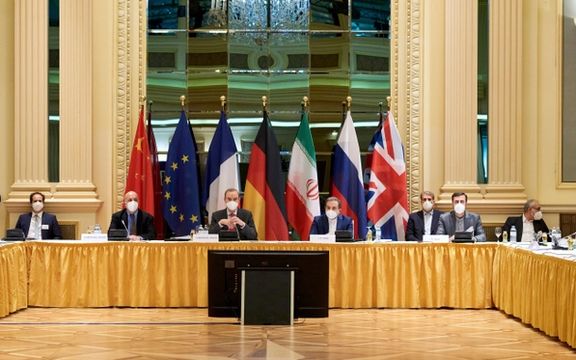
Western powers have been trying for weeks to get Tehran's answer to one question - when will it return to nuclear talks that have been on hold since June.
Iran's response has been a simple "soon", even at one point saying that 'soon' has a different connotation in Iran.
Behind Tehran's stalling is an attempt to gain leverage to extract more concessions when negotiations do eventually resume, officials and analysts said, including by advancing its uranium enrichment program, a possible pathway to a nuclear bomb.
Iran has long denied seeking to weaponize nuclear energy.
The talks, which aim to bring both Washington and Tehran back into compliance with a 2015 nuclear pact aimed at curbing the Iranian enrichment program, were adjourned in June after hardliner cleric Ebrahim Raisi was elected Iran's president.
"Iran will eventually return to the talks in Vienna. But we are in no rush to do so because time is on our side. Our nuclear advances further every day," a senior Iranian official said on condition of anonymity.
Ali Vaez, senior Iran analyst at the International Crisis Group, said "more time equals more leverage, given the exponential growth of Iran’s nuclear program".
While China and Russia, closer trading partners of Iran, are more restrained, Western parties to the pact can scarcely conceal their frustration. The United States and European powers have urged Iran to resume talks, saying the diplomatic window would not stay open forever as Tehran's nuclear program is advancing well beyond the limits set by the 2015 pact.
The nuclear agreement limited Iran’s uranium enrichment activity to make it harder for Tehran to develop nuclear arms, in return for lifting international sanctions.
But former U.S. President Donald Trump ditched the deal in 2018, saying it did not do enough to curb Iran’s nuclear activities, ballistic missile program and regional influence, and reimposed sanctions that have crippled Iran’s economy.
In response, Tehran breached the deal by rebuilding stockpiles of enriched uranium, refining it to higher fissile purity and installing advanced centrifuges to speed up output.
"They (Iran) keep saying they are going to come back to the table. But when they say soon ... it means absolutely nothing," said a senior European diplomat.
"That doesn't mean we think they don't want to come back, but we think they want their cake and to eat it. They want to create a fait accompli on the ground - technical and nuclear - and preserve the possibility of a negotiation."
MORE FOR LESS
Emboldened by the chaotic U.S. withdrawal from Afghanistan, Iran's rulers are confident their stalling strategy will not bring serious repercussions, analysts said, especially when U.S. President Joe Biden is embroiled in a growing rivalry with China and battling a COVID-19 crisis at home.
In contrast, the Biden administration is signaling that Iran should take nothing for granted.
Top US officials will tell visiting Israeli counterparts in Washington on Tuesday they are committed to diplomacy but would be prepared to pursue "other avenues" to ensure Tehran does not acquire a nuclear weapon, a senior U.S. official said.
Israel says it will not allow Tehran to get a nuclear bomb.
The man with ultimate authority in Iran, Supreme Leader Ayatollah Ali Khamenei, has blamed the United States for the pause in the talks.
"Ayatollah Khamenei seems to believe that by waiting, he can get a better deal from Washington. That time is on his side," said Meir Javedanfar, Iran lecturer at Israel's Reichman University.
Tehran and Washington still disagree on which steps need to be taken and when, with the key issues being what nuclear limits Tehran will accept and what sanctions Washington will remove.
The fact that indirect talks between Tehran and Washington paused after the election of Raisi was a sign of Tehran's plan "to press for major concessions" from the United States, said a former Iranian official.
"The establishment is also weighing different tactics to get more and give less in return. It takes time to determine their strategy," he said.
Naming Ali Bagheri Kani, an ardent critic of the 2015 pact, to replace former pragmatist chief nuclear negotiator Abbas Araghchi, signals Tehran will take an uncompromising approach when the talks resume, Eurasia Group analyst Henry Rome said.
ECONOMIC RISK
In addition to seeking the lifting of Trump-era sanctions in a verifiable process, Tehran also wants Washington to remove Iran's Revolutionary Guards from a terrorism blacklist. It also wants Europe to guarantee foreign investors will return, and assurances that Washington will not renege on the deal again.
For his part, Biden wants to restore the pact's nuclear limits and, if possible, extend them while pushing back against what he has called Iran's other destabilizing activities.
Sanam Vakil, deputy director of Chatham House’s Middle East and North Africa Program, said Iran would 'win' if it gained further concessions from Washington, but should the deal collapse Iran's rulers sense that they could survive through "maximum resistance", a reference to economic self-reliance.
However, Iran's foot-dragging strategy could weaken the country's clerical rulers by further hurting an economy already grappling with squeezed oil revenues.
The authorities fear a re-eruption of unrest among its core supporters lower-income Iranians - whose periodic bouts of protest in recent years reminded them how vulnerable they could be to popular anger over economic hardships.
"A failure to revive the nuclear deal entails real economic risk for Iran ... but politics trumps economics right now," Rome said.
Analysis by Parisa Hafezi and John Irish, Reuters
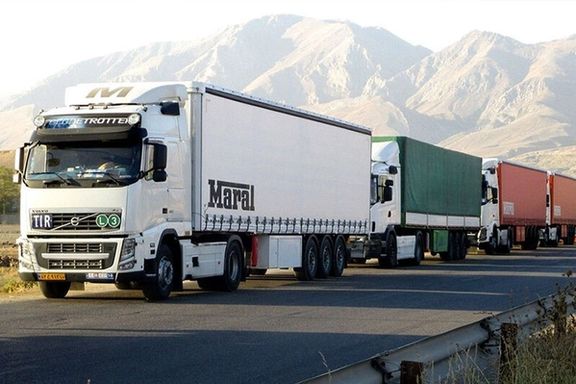
Iran is ready to help Armenia complete its North-South Road so both can avoid a road controlled by Azerbaijan since last year’s Armenia-Azerbaijan war.
Press TV, Iran’s English-language broadcaster, and Armenian news agencies reported that Deputy Transportation Minister Kheirollah Khademi arrived in Armenia Monday to express Tehran’s financial and technical support for a project allowing cargoes from Iran and elsewhere to bypass Azerbaijan-run territory on their way to Russia and Europe.
Khademi is visiting construction sites for Armenia's Tatev project, a 400-kilometer transit road linking the Iranian border crossing at Nordooz to the Armenian capital Yerevan.

Over half a 43km road, from Tatev to Aghvani, bypassing the Goris-Kapan stretch that is in the Armenian region of Syunik but since last year’s war under Azeri control, has been built. But it is barely suitable for large trucks and trailers. Armenia is planning a third bypass road, from Tatev to Ltsen.
In his joint press conference in Tehran Monday, Armenia's Foreign Minister Ararat Mirzoyan said he had briefed his Iranian counterpart Hossein Amir-Abdollahian on the new roads. The Iranian foreign minister said that joint plans for direct transit would be "finalized and implemented" very soon.
As things stand, Iranian trucks face a $130 levy imposed by the Azeris, who have been stopping Iranian trucks using the Goris-Kapan road.
Armenian economist Suren Parsyan Monday told the United Kingdom-funded JAMnews that Armenia’s annual trade turnover with Iran was $410 million, made up of $90 million of electricity exported to Iran and $320 million in imports of gas, oil products, fertilizers, and construction materials.
Armenia exports to Arab and Asian countries through Iran. For Iran, Armenia offers access to markets in Georgia, Russia, the Black Sea states, and European countries.
According to Parsyan, the Tatev-Aghvani road cannot support the same volume of cargo even if widened. Parsyan also told JAMnews that the budget constraints meant construction would be delayed until at the end of 2022 and might take three years.
Regional tensions, which have simmered since last year’s Armenia-Azerbaijan six-week conflict, escalated August 25 when Azerbaijani troops denied Armenian vehicles access to part of the 21km Goris-Kapan road. The arrest of two Iranian truck drivers for "illegal entry into Azerbaijani territory" caused alarm in Tehran.
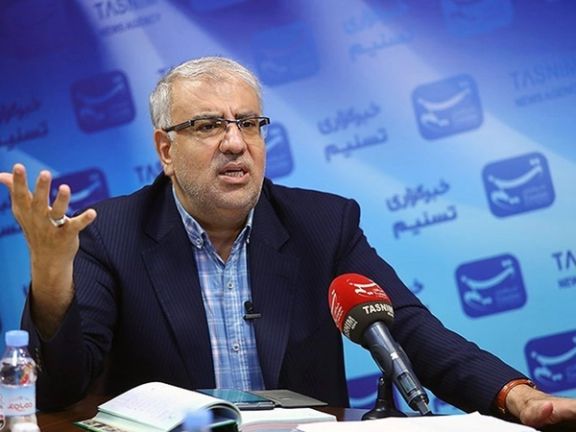
Iran is ready to solve the global energy crisis if the West lifts crude oil export sanctions, oil minister Javad Owji claimed on Monday, amid domestic shortage.
Owji’s claim came as Iran is bracing for a serious natural gas shortage this winter that will certainly lead to major energy shortage and also power cuts impacting both residential and industrial customers, similar to electricity shortages last winter.
Top officials in both the capital Tehran and the central city of Esfahan have warned of gas shortages in the fall and winter.
In absence of foreign investments of money and technology in Iran oil and natural gas sectors, production in South Pars gas fields in the Persian Gulf have not kept up with rising domestic demand and exports to Iraq.
Consumer demand for electricity has particularly increased because Iran offers the cheapest rates in the world. Consumers have little incentive to save energy, with electricity demand rising to 60,000 megawatts in summer and winter peak seasons.
Just in Esfahan, the general manager of the local gas company warned that daily shortages this winter will reach 25-million cubic meters of gas. Owji had warned in September that the country would face a 200-million cubic meter shortage this winter.
Reports in local media have said that fuel reserves at power stations is 30 percent less than required for winter months. Part of the problem is lack of tanker trucks to feed the power plants as many have become too old to operate. This is an indication of lack of investments as the country has been under UN or US sanctions during most of the past decade.
Thenatural gas shortage also has an environmental consequence, when Iranian power plants resort to burning mazut, a dirty oil biproduct. Last winter, smug and pollution covered all major Iranian cities as mazut was used to compensate for the gas shortage.
Iran is the Middle East’s largest electricity generator and the 14th largest globally. Ashley-Edison, A UK electricity leader estimates 80 percent of Iran’s output is from from fossil-fuel plants, 16 percent from hydroelectric plants, and 1.3 percent from Iran’s sole nuclear power plant at Bushehr. Tehran is in talks with Russia and South Korea over building eight atomic reactors.
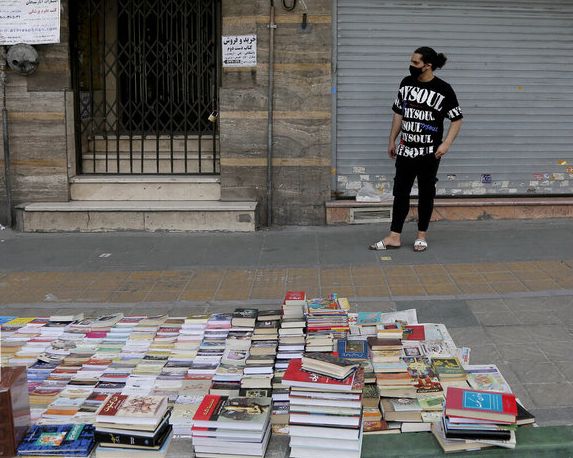
Police in Iran have started to clamp down on street book vendors in recent days, saying they reduce the profit margins of legal bookstores.
On a main Tehran street, where street booksellers traditionally display their selections on sidewalks, police on October 2 forced many to take their books and leave. Citizens began reacting on social media, condemning the police action.
Government-controlled media has begun defending the decision to ban street book stands, arguing that these vendors make more money than official bookstores.
But many say the real reason is the banned books offered by street vendors that regular bookstores are not allowed to sell. One example mentioned even by authorities is books about Iran’s monarchy, which the Islamic Republic is extremely sensitive about.
For a book to be published in Iran there is a lengthy authorization process, with government censors carefully reviewing the content and making notes of what pages or paragraphs break the regime’s ideological or political red lines.
The government also argues that street booksellers offer illegal copies of published books, which in some cases might be true, but they generally sell used books for lower prices.
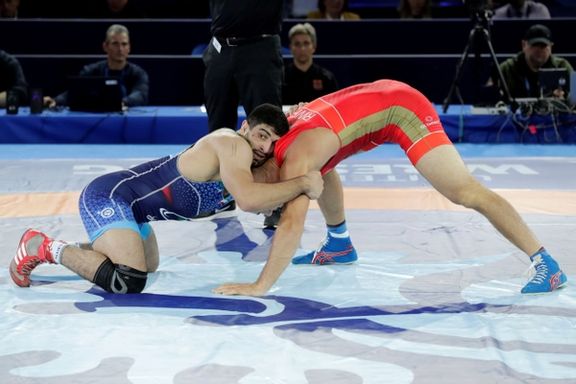
Mixed fortunes for Iran on the third day of the Wrestling World Championships in Oslo, Norway, with gold finally coming at the fourth time of asking.
Iranian wrestlers featured in all of the night's gold medal matches, but it wasn't until the heavyweights took to the matt, that Iran could celebrate gold medal in a confident match.
In the first final, the 57kg class, American Thomas Gilman outclassed Iran's Alireza Nosratolah Sarlak, while Russia's Zagir Shakiev won a battle of attrition with Amirmohammad Babak Yazdanicherati in the 65kg event.
Mohammad Ashghar Nokhodilarimi also had to settle for silver in the 79kg division after losing 5-1 to America's Jordan Burroughs.
In the final match of the night Kamran Ghorban Ghasempour faced off against Magomed Guseynovitch Kurbanov of Russia.
He started well and never looked as if he was going to lack strength, going on to win 8-4.
Report by AP